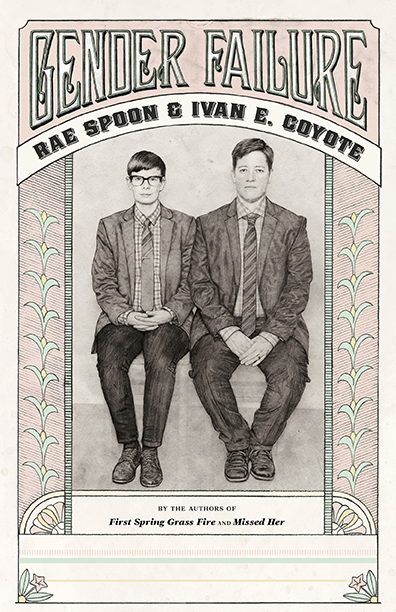“I had no way to talk about gender. I wasn’t allowed to express how uncomfortable it was for me. To resist would have put me in danger, so I kept any subversive thoughts covert. As a person who couldn’t conform to what was expected of me, I thought I was a failure and kept it to myself…”
So begins Gender Failure, a collection of autobiographical vignettes, lyrics, sketches and essays by Rae Spoon and Ivan E. Coyote. Within its pages, Coyote and Spoon — both of whom identify as transgender and use the pronoun “they” — relate moments of their lives in which they navigate ill-fitting gender rules, roles and assumptions. They attempt to weather those awkward moments with patience and dignity, while feeling others’ erosive judgments (conscious or not) chip away at them.
Navigating an intense and intimate journey
The dual memoir — written to complement their acclaimed multimedia live show — is an intense and intimate journey through moments that are sometimes charming, sometimes uncomfortable, but often unexpected.
Along the way, the two find acceptance in surprising places, such as when Spoon encounters a transitioning teen in Prince George, or when Coyote discusses replies from family, after what they describe as their second coming out.
Yet, both also discover alienation from people they most expected to be able to turn to for support: for Spoon, this comes from being pushed toward a transgender narrative which (though closer) didn’t quite fit them either; for Coyote, it’s the jarring change in attitude they witnessed from a gay male friend, once a trans acquaintance left the room.
Both of the authors have a gift for reaching deep within, finding moments in their lives that are sometimes humourous, sometimes poignant and retelling those moments vividly and candidly. It makes sense that they’d complement each other, in alternating chapters. The deeply personal reflection they’re known for shines through.
Coyote chronicles a trip through the medical system for chest surgery: “The government will pay for you to get fixed, but only if they decide you are broken in the right way.” And also the politics of navigating washrooms and opening up to their family about having chest surgery — and by extension, being transgender-identified in the first place. Earlier, they relate one of the most powerful passages, in the charm-turned-heartbreak story of their friendship with Rosie — a formative moment that is unforgettable:
Sometimes, I catch a glimpse of the shape of her or see a footstep that looks like the way she walked in someone else on a sidewalk some days and my heart skips, but it always stills quickly. I know Rosie is dead. She wasn’t for awhile when she was first gone, but she is now, I can feel it. I still remember everything I learned from Rosie. She taught me how to take something some people might just throw out, and then sweat and work and love it back to beautiful…
Spoon tells how being known for breaking gender rules gives them some license to break musical ones — integrating styles as disparate as country and electronic music. And yet, even given that latitude, they find they’re still never completely given the freedom to just be themself.
They relate a clumsy foray into drag and how being Cocolene was a learning experience, but not in the way one might think. They also discuss finding a certain freedom in living as male, but feeling a nagging sense that there was still some false narrative remaining in their life — and eventually shedding it by eschewing gender altogether.
How do you experience gender?
Through it all, readers discover two complex individuals, with diverse experiences, wanting to be known for their ambitions and works, and tired of having to explain their gender — yet continuously having the question (and the varying judgments that accompany it) thrust upon them.
And therein is the heart of the collection: a dissection of the many different ways that we experience gender, moment-to-moment, made that much more pointed when a person runs afoul of the artificially constructed rules, beliefs and expectations which, unconscious to most people, are pervasive and attempt to define us.
We see just how subjective and arbitrary these gender assumptions are — Spoon describes being alternately read as male or female, and as 14, 20 and 30, all within the same hour — along with the insights they deliver: “… I can see how the only way that youth can respond to hostility is hostility. There isn’t a lot of room for anything else when people treat you like they don’t have to respect you…”
Together, Coyote and Spoon step beyond a traditional trans narrative to deliver these vignettes in an organic, frank and artistic way. In relating these collected moments in which they had felt as though they were failures at gender, one realizes instead that it was gender — and all its presumptuous rules — that had instead failed them. Yet in spite of all that, the book remains hopeful, with the two managing to carve a space for themselves, regardless.
Mercedes Allen is a graphic designer and advocate for transsexual and transgender communities in Alberta. She writes on equality, human rights, LGBT and sexual minority issues in Canada, and the cross-border pollination of far-right spin. She blogs at Dented Blue Mercedes and operates a trans information website at http://www.albertatrans.org/



